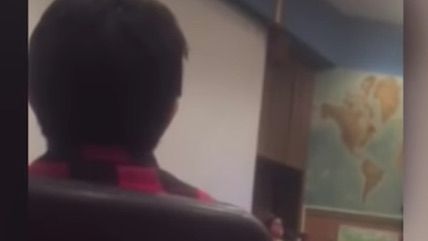Orange Coast College Suspends Student for Recording Professor's Anti-Trump Rant
Prof said she would 'no longer tolerate any person who voted for Trump.' But that's protected speech.


A community college in California has suspended a student for a full semester because he recorded his professor calling Donald Trump's election "an act of terrorism" and leaked it to the press.
The student, Caleb O'Neil, must write a three-page apology letter to Olga Perez Stable Cox, an instructor at Orange Coast College who teachers human sexuality.
In a clip of the recording, published by Campus Reform, Cox says of Trump's election: "We have been assaulted, it's an act of terrorism. The people who committed the assault are among us, it's not some stranger coming in from another country coming in and attacking our sense of what it means to be an American." She also says she would "no longer tolerate any person who voted for Trump."
O'Neil campaigned for Trump, according to The Orange County Register, and felt singled out by Cox's comments. He claims he was afraid his instructor would retaliate against him, and recorded her comments in order to demonstrate to administrators that this was the case. After growing frustrated with the administration's handling of the situation, he went public with the recording, which quickly went viral.
In response, Cox received a torrent of abusive messages from Trump supporters, forcing her to temporarily move out of her home.
The college now claims that O'Neil violated the student code of conduct, as well as Cox's syllabus.
"Unauthorized recording is a serious violation of the Student Code of Conduct," wrote Interim Dean of Students Victoria Lugo in a letter to O'Neil.
Does the university have the right to punish O'Neil? It's a little complicated. Most states permit the recording of private conversations, as long as one of the parties involved consents. But some states, including California, require two-party consent.
There are exceptions, however. Statements made in public might not be protected, since a speaker in a public setting doesn't necessarily have a reasonable expectation of privacy. Whether a university classroom counts as a public setting is legitimately debatable, as far as I can tell.
But O'Neil isn't being charged with violating the law—he's accused of violating university policy. Joshua Recalde-Martinez, president of the OCC College Republicans, tells Campus Reform that the policy is so broad that virtually everyone has violated it.
"Anyone who uses their phone in class is automatically violating that portion of the student code of conduct," he said.
Cox's syllabus also prohibits students from recording class proceedings.
O'Neil now has legal representation, and plans to appeal his suspension. His lawyer, Bill Becker says the school's actions amount to "an attack by leftists in academia to protect the expressive rights of their radical instructors at the expense of the expressive rights of conservative students on campus."
That's his argument. The school's argument would be that professors should have the right to declare their classrooms a zone of privacy, and O'Neil very clearly violated Cox's.
While I find the punishment a bit harsh, I'm having a hard time coming up with a reason to excuse O'Neil's behavior. Cox's anti-Trump statements might have been over the top, but as a professor at a public university who enjoys robust free speech protections, she had every right to make them. O'Neil's contention that he feared retaliation sounds very similar to claims made by leftist students that certain kinds of non-liberal expression make them feel unsafe.
Indeed, I worry that conservative students are already embracing the campus victim narrative and assuming that political statements they dislike are automatically targeted acts of intolerance. When students hear something that makes them uncomfortable, they ought to challenge it, rather than appeal to the authorities—regardless of whether they are conservatives or liberals.


Show Comments (84)